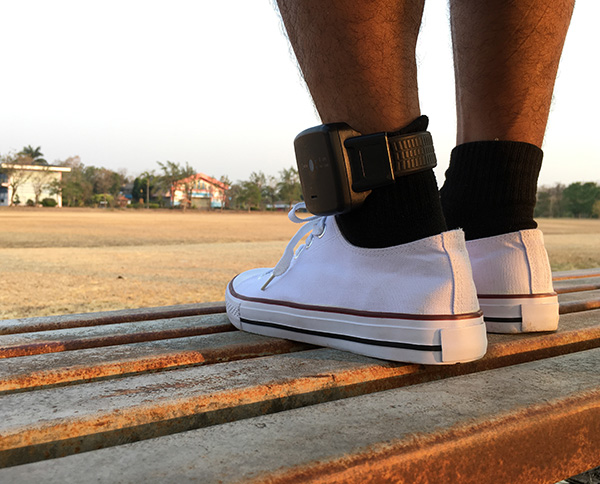If you believe you may be instructed to wear a court-ordered GPS monitor, you probably have many questions.
Dean Tsourakis, an experienced Clearwater criminal defense attorney, is dedicated to helping people in these situations by defending their rights and ensuring you have the information needed related to Florida ankle monitor laws, rules, costs, and more.
What Is An Ankle Monitor with GPS?
A court-ordered GPS monitor is worn on the ankle and cannot be removed until the court-approved date. It is a device that the courts will use as a substitute for harsher penalties, such as incarceration. An ankle monitor in Florida is typically worn when a defendant is on house arrest, probation, or parole. A judge may also order them for a defendant prior to going to trial.
Wearing an ankle monitor in Florida is often referred to as community control. Court-ordered GPS monitors are supervised and monitored by the Florida Department of Corrections.
How Do They Work?
Ankle monitors with GPS are used to track your location, and they are monitored 24 hours per day around the clock. GPS technology uses radio frequency signals to communicate your location to a monitoring station. Depending on your particular case, the courts may rule that you have certain limits on where you can go. If you go outside a specific perimeter, the court-ordered GPS monitor will alert the monitoring station.
If you are found to be in noncompliance with the court order, the Florida Department of Corrections will create a noncompliance report. These reports are then investigated by a community control officer, resulting in law enforcement apprehension.
Another one of the ankle monitor rules is that you cannot attempt to damage or remove the device. If you try to damage or remove it, the device will automatically send a signal to the law enforcement agency or agencies monitoring you. Florida HB 75, passed by the legislature and signed by the governor in 2016, made the removal of a court-ordered GPS monitoring device a third-degree felony.
How Much Do Ankle Monitors Cost?
In addition to any fines and fees you may be facing, you should be aware that there is an ankle monitor cost. According to Florida statute, the person who has a court-ordered GPS monitor has to pay for the monitoring services, including the device’s installation and monitoring.
Costs can vary somewhat, and there is a subsection in Florida Statute 287.057, which requires that the procurement of electronic monitoring services will be a competitive process.
It can cost, generally speaking, up to hundreds of dollars to install and hundreds of dollars per month for the monitoring services. If you are designated to get an ankle monitor in Florida that also monitors alcohol – a Secure Continuous Remote Alcohol Monitoring (SCRAM) bracelet, the costs can increase. These SCRAM bracelets are often part of probation GPS monitoring after a DUI arrest or conviction.
What Types of Crimes Get An Ankle Monitor in Florida?
Multiple crimes are listed in state statutes as part of the Florida Department of Corrections community control program.
One of the primary ones that include a court-ordered GPS monitor, as listed above, is a DUI or driving under the influence of drugs. The SCRAM bracelets monitor the individual’s hourly alcohol levels by testing their sweat. The data is then uploaded into a database monitored by law enforcement, in addition to location tracking. These bracelets are often used before the trial date of a defendant as a cost-effective way (for law enforcement) to keep people out of jail.
Sex offenders, domestic violence offenders, those involved in drug crimes, prior DUIs, flight risks, and others on parole or probation can be ordered to wear a probation ankle monitor.
Court-ordered GPS monitors are often used if you are on house arrest or community control. Depending on the circumstances, the judge may allow you to go to work, doctor’s appointments, perform community service, or to religious services.
Additionally, ankle monitors in Florida are sometimes utilized by U.S. Immigration and Customs Enforcement (ICE) to place a person in the U.S. illegally into a detention center, pending their upcoming hearing.
Florida Ankle Monitor Rules
The first Florida ankle monitor rules that many people think of are limitations on where you can go in a particular geographic region, but multiple rules are commonly placed on individuals. It is on a case-by-case basis, but understanding your rules and any potential consequences of violations is key to your future freedom and quality of life.
Here are some common rules for individuals with ankle monitors:
- Meeting with their probation or parole officer at scheduled times
- Keeping a job
- Paying all of their court fees
- Abstaining from drugs and alcohol
- Staying in compliance with each condition of supervision for the duration of the court-ordered GPS monitoring
If you break the rules, there can be serious consequences. You will be subject to arrest. Depending on the conditions of your case, you may face more strict monitoring terms, have your parole revoked, and face jail time.
Motion to Remove Electronic Monitoring
In certain circumstances, your criminal defense attorney may be able to file a motion to remove mandated electronic monitoring. These are primarily done in the pre-trial phase and for those without a criminal history, which is called a Motion to Modify Pretrial Release Conditions (GPS).
It is advised to consult with a criminal defense attorney to determine whether this may be an option for your case.
Get the Right Legal Representation
When the future is unclear, seek the right path. Dean Tsourakis is here to help you through it. He provides clear steps and the simplest possible solution to the problem you face.
He is a highly experienced criminal defense attorney, and experience really matters when it comes to criminal cases. No matter the charge, he works hard for fairness and justice.
Contact Dean G. Tsourakis to schedule a free, confidential consultation today.
on Apr 5, 2022

